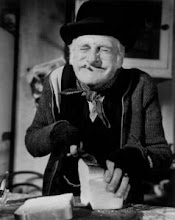Friday 28 December 2007
Speaking 'the Queen's Mother's Language...'
Thursday 20 December 2007
Radio One - Censorship or Responsible Broadcasting?
Friday 11 May 2007
Ye huv tae keep up language wise
Kidspoem/Bairnsang
it wis January and a gey driech day
the first day Ah went to the school
so my Mum happed me up in ma
good navy-blue napp coat wi the rid tartan hood
birled a scarf aroon ma neck
pu'ed oan ma pixie an' my pawkies
it wis that bitter
said "noo ye'll no starve"
gie'd me a wee kiss and a kid-oan skelp oan the bum
and sent me aff across the playground
tae the place a'd learn to say
it was January
and a really dismal day
the first day I went to school
so my mother wrapped me up in my
best navy-blue top coat with the red tartan hood,
twirled a scarf around my neck,
pulled on my bobble-hat and mittens
it was so bitterly cold
said now you won't freeze to death
gave me a little kiss and a pretend slap on the bottom
and sent me off across the playground
to the place I'd learn to forget to say
"it wis January and a gey dreich day
the first day Ah went to the school
So ma Mum happed me up in ma
good navy-ble nap coat wi the red tartan hood
birled a scarf aroon ma neck
pu'ed on ma pixie and ma pawkies
it wis that bitter"
Tuesday 20 March 2007
Language Change Snippet : Nice try, Ronald!
Terminology check: neologism
Seduced by an accent...
Thursday 1 March 2007
What's in a name?
Oisín Rhys Kelly as branded by his parents on 1/03/2007
[with apologies to Dave and exponents of the alphabetical principle]
Oisín is now one week old and I have spent much of the past seven days explaining the pronunciation of his name to those unfamiliar with Irish spelling and phonetics. Which is mostly everyone, including some Irish people themselves. (It is "Osh-een" by the way). A part of me is mindful of the possibility that I have condemned him to a life of wearisome explanation- "It's Irish. That's why the spelling makes no sense." Indeed he may well curse the day his parents trotted off to the register office congratulating themselves on their rather exotic choice of name. I can almost picture him now in a not too distant future - sitting alone in a cold bed-sit, his life ruined because of the angst created by having a name hardly anyone can pronounce. "Why couldn't you give me a name conforming to the alphabetical principle? Why couldn't you call me DAVE!", I hear him cry. But I am hopeful that Oisín's name will not be an irritant to him or others but an opportunity to celebrate the unfamiliar. Moreover his forenames will be a reminder to him of both a paternal and maternal Celtic ancestry and I hope he becomes very proud of it indeed. And anyway let's face it - it's better than 'Dave'.

